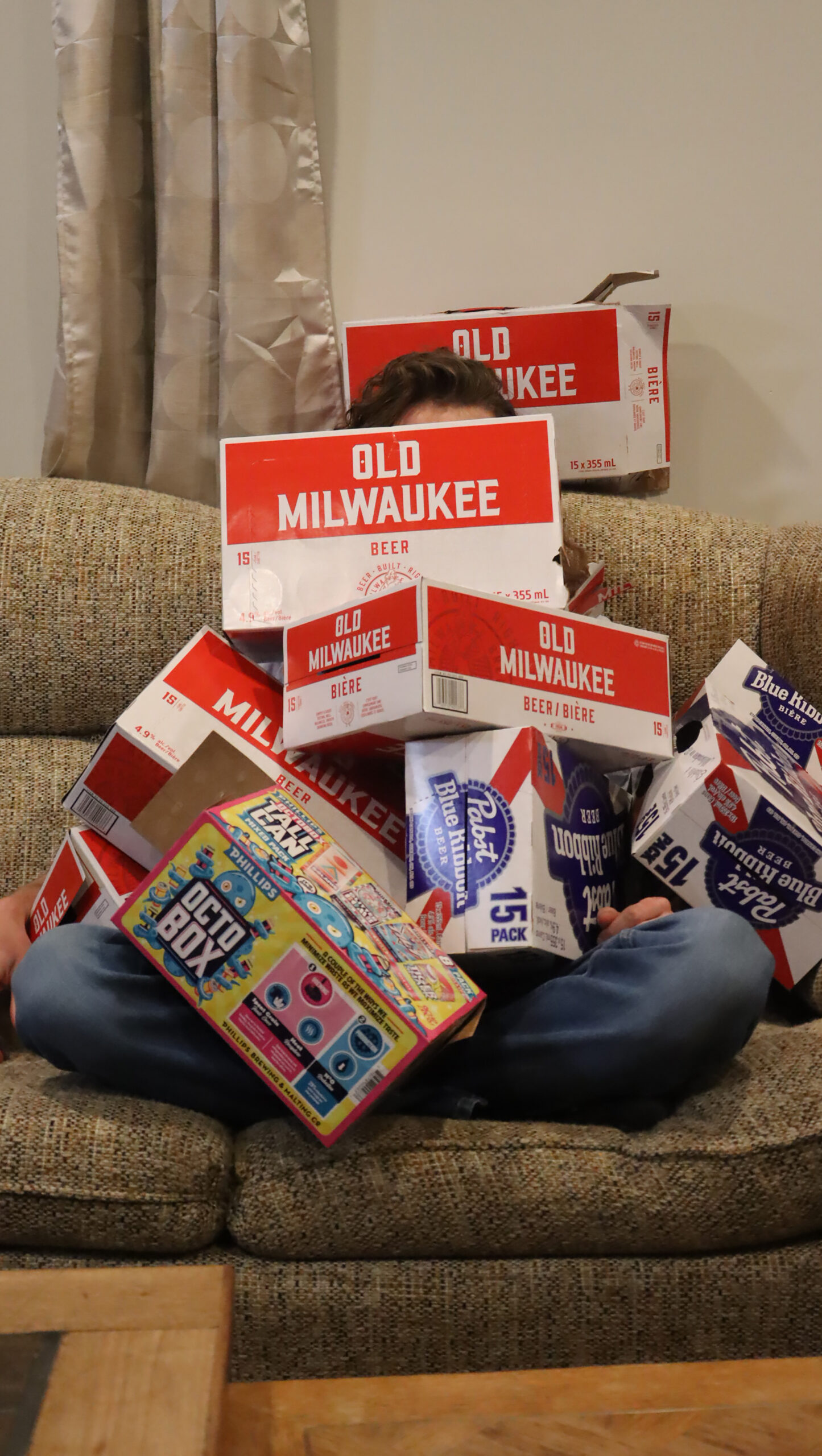Tyler Eresman, buried under boxes of alcohol, has been sober since his first year of university.
When we were told this edition of the Endeavour would be a mental heath issue, I instantly thought of addictions. With my own struggles with addictions. I thought I would try to quit smoking and write about my own journey in becoming smoke-free. I bought a pack of cigarettes three days ago and have already had four while writing this article.
The stress of post-secondary can lead to the emergence of addictions in some people. These include addictions to substances that are normally accepted in society, such as alcohol or nicotine in the form of cigarettes or more commonly now vapes.
Smoking, at least in the form of cigarettes, is no longer a commonplace thing at most post-secondary campuses. But nicotine addictions across the country are on the rise.
According to the 2019 Canadian Tobacco and Nicotine survey completed by Statistics Canada, there has been an increase in adolescents who are active users of e-cigarettes containing nicotine. A total of 15 per cent of teenagers aged 15-19 vaped in the past 30 days, with the same percentage occurring in adults aged 20-24.
I started smoking cigarettes when I was 15 years old. I had experienced my first heartbreak and was offered one by a friend. I smoked it with him and we laughed together. I turned 24 this year. It’s been almost 10 years since my first drag. It has started to take its toll on my body. I cough in the morning and have trouble breathing at night. As young as I am, I no longer feel youthful.
It has long been said quitting nicotine is as difficult as quitting heroin.
Heroin addicts say it is easier to give up dope than it is to give up smoking,” says Dr. Sharon Hall in an article titled “Nicotine: harder to kick… than heroin” published In The New York Times Magazine in 1987.
So how are you supposed to quit? Lori Harasem, health promotion coordinator at Lethbridge College shared her own personal journey.
“It’s hard. It’s one of the hardest things I’ve done in my life. I smoked two packs a day, so I was a heavy smoker. I want to say I tried everything,” Harasem says.
According to an article titled “Quitting Smoking? Expect a Lot of Failure Before You Succeed” published in 2016 by Healthline by Brian Kran the average smoker attempts to quit almost 30 times before the final attempt.
Harasem told me the real reason her last attempt was successful was because her five-year-old at the time told her smoking would kill her.
I’ve probably tried six or seven times at this point. It is difficult. The withdrawals consume me every time I try to quit. I became irritable, prone to anger. No longer myself.
Harasem finally found success quitting through different methods, notably a desktop computer app tracked how much money she had saved while quitting smoking.
Nicotine addiction is just one of the common addictions among post secondary students. According to the Canadian Postsecondary Education Alcohol and Drug Use Survey, 60 per cent of those surveyed showed patterns consistent with heavy drinking.
In addition to the nicotine addiction, I fit into the 60 per cent that show patterns consistent with heavy drinking.
Tyler Eresman, an alum of Lethbridge College says they struggled with alcohol addiction while attending the college. We discussed his victory over alcohol after a brief cigarette together.
“I think that while I was at the college, I was aware of my addiction, but I was also just in denial,” Eresman said.
To Eresman, one of the most important parts of recovery is having a support system.
“Its very important to have a support system. You can’t do that entirely alone. You may think you can, but you need to reach out to people.”
Eresman has been sober since his first year of university.
The stigma of addiction is a very real force that prevents some people from seeking help. If you are struggling with addictions, the first step is to seek help.
I don’t know if this is the force that prevents me from seeking help. I know that I have problems. Problems that left unchecked for long enough will have serious consequences.
What I do know is there I still have to take the first step. Acknowledgment of my problem is not enough. I keep waiting thinking there is a “convenient time” to quit. There isn’t. I keep waiting. But I know what the correct first step is.
Counselors are available at the Wellness Centre at Lethbridge College and you can call Wellness Together Canada at 1-866-585-0445.



